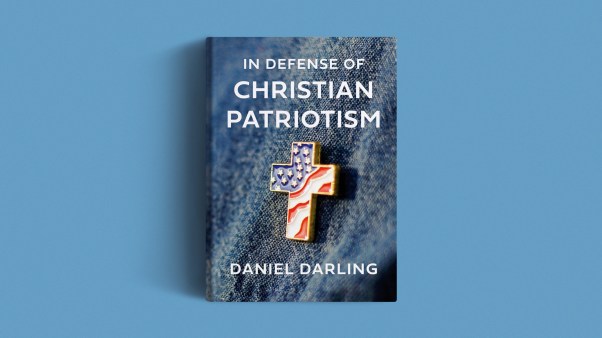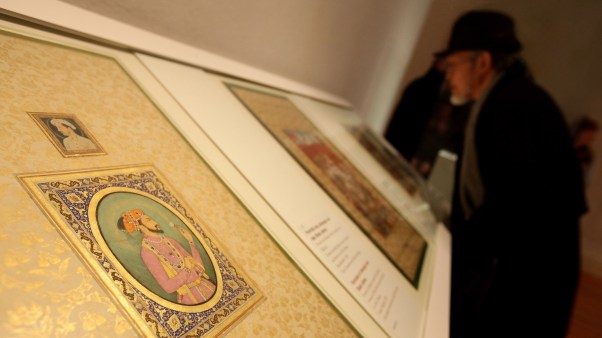A Syrian soldier stopped a motorist at a roadblock in western Beirut during the bloody fighting last month and demanded to see his identity card.
The man, whose name was Khoury, produced it. Khoury, a common name, is Arabic for “priest,” so the soldier asked whether the driver was a member of the Maronite branch of Roman Catholicism. Maronites are Lebanon’s largest Christian community, with about 600,000 adherents of roughly 1 million Christians in the country.
When the man nodded yes, the soldier said, “Then you are a Phalangist.” Like most Arabs, the soldier identified all Maronites with the Phalange and National Liberal parties, whose private militias had been trading artillery barrages with the Syrian forces for a week.
This incident, described by eyewitness Los Angeles Times reporter Joe Alex Morris, Jr., highlights the role that religious confessions play in Lebanon’s deadly strife. This particular Khoury, it turned out, was no member of the Phalange. But nine times out of ten the soldier would have been right. The push to partition Lebanon comes basically from the Maronite Christians. Other major Christian communities, such as the Greek and Syrian Orthodox and Greek Catholic churches, have not been inclined to provoke a face-off with their Muslim neighbors.
Geography and history help explain the Maronite stance. What is today Lebanon was once part of the Byzantine or Eastern Roman Empire. Its people were of the Orthodox (Greek) Church.
Muslim armies swept through the area in the seventh century and brought it under Arab administration. The coastal and interior lowlands were gradually Islamized, but the Lebanon mountain range became a kind of Christian sanctuary. This was especially true for the Maronites.
Two centuries earlier, St. Maron, an ascetic, led a breakaway movement from the Orthodox Church. His distinctive teaching was that while Christ has both divine and human natures, he has only a divine will. This teaching of a single will (monothelitism) was branded as heresy at the Council of Constantinople in A.D. 680, and the Orthodox rulers brutally persecuted the Maronites as heretics. The Maronites found refuge, first from the Byzantine, and then from the Muslim authorities, by settling in the mountains of Lebanon. They have successfully guarded their identity and independence there ever since.
Although Maronite Christians have adopted the Arabic language, they consider themselves Phoenician rather than Arab. And since they lack significant ties with Arab nations other than Lebanon, the Maronites have historically looked outside the Arab world for protection. They sided with the Crusaders in the eleventh and twelfth centuries, and were receptive to French (Catholic) rule and culture during the League of Nations mandate period between the two world wars. (The Maronites abandoned their monothelite doctrine in the twelfth century. They joined the Roman Catholic Church in 1736, retaining a degree of autonomy and their own distinctive liturgy.) Now they have forged a tacit entente with Israel.
Ironically, it was the creation of Israel and its after-effects that knocked out of alignment the religious population balance on which Lebanon’s government was based.
France carved Lebanon from Syrian land and into a configuration—confirmed in the 1930s by the only census for the area in this century—that established a six-to-five Christian-Muslim ratio. Since Lebanese independence, granted in 1943, the Christian numerical edge has been gradually eroded because Muslim families have more children and because more Christians are emigrating to the West.
But it was the influx of Arab refugees after the 1948 and 1967 Arab-Israeli wars that tipped the balance. Thousands of Palestine Liberation Organization troops, ejected from both Jordan and Syria in the early 1970s, also arrived. Their law-unto-themselves deportment, and the Israeli retribution their raids incurred, led to the 1975–76 civil war.
The Maronite faction was heading toward defeat in that war until the Syrian (Muslim) forces intervened on their side against Palestinians and Lebanese leftists, most of whom are Muslim.
The Lebanese fighting that has raged in recent months first erupted in February. The Syrians tried to collect weapons from the Phalange and National Liberal party militias. They resisted, maintaining that the Palestinians were not being similarly disarmed. The surge of fighting last month focused on expiration on October 26 of the mandate of the 30,000-man Arab League force (almost all Syrian).
The other Christian communities of the region are unlikely to follow the Maronites into an alliance with Israel.
For example, the four major patriarchs of the Greek Orthodox Church are situated in Damascus, in Arab Jerusalem under Israeli control, in Alexandria, and in Istanbul. These operate with a caution bred by centuries of coexistence with Islam. They minister to important congregations and interests, and there is little doubt that they see the Maronite initiative as harmful to Christian interests over the long term.
On the Muslim side is a strong and understandable resentment against the perpetuation of Maronite dominance in a country where neither that community alone nor all Christians combined are any longer a majority of the population.
Viet Nam Update
A five-person Mennonite Central Committee delegation visited Viet Nam last summer, holding extensive private conversations with evangelicals and Catholics in the country’s southern region. Delegation member James Stauffer filed this report.
Religious activity in Viet Nam has been greatly reduced. Before 1975, Tin Lanh (Evangelical) Church life in Viet Nam was geared to public evangelism. The Roman Catholic Church, on the other hand, relied on its institutional programs for growth and outreach. The end of the war brought a quick finish to those religious programs for both churches.
Public and mass evangelism is no longer permitted Tin Lanh church members. Former Catholic social, medical, and educational institutions are now fully controlled and operated by the state. The practice of organized religion is generally limited to worship services.
Church leaders report that they now have to get governmental permission to conduct regular services. Permission to hold such special programs as an annual conference requires a tremendous amount of time and red tape. Pastors must be careful what they say in their sermons: One minister was arrested because he mentioned that in the Second Coming “Russia will be destroyed.”
The Tin Lanh Church always professed to be “neutral” as far as political party, allegiance, or ideologies were concerned. However, it was generally known that members were anti-Viet Cong, anti-Communist, pro-American, and, to a lesser extent, pro-Diem or pro-Thieu.
Church members felt obliged to allow their young men to be drafted into the South Vietnamese army. For the church to invite a high military official to open an annual conference was common practice. Providing chaplains for the armed forces was looked upon with favor because of its potential for evangelical outreach. But in the new Viet Nam, church leaders are being reminded that they “were involved in politics” because they condoned the status quo and neglected to protest injustices of the old regimes.
Why did Vietnamese evangelicals collaborate with a foreign military power? Why didn’t they protest the Americanization of their economy and culture? How can church members prove they were not CIA agents?
The church is looking for ways to prove its innocence in relation to these charges. Some pastors are now members of local government committees.
Some events usually associated with religious or spiritual revival have taken place since 1975. Very conservative moral standards have accompanied the socialist revolution. Some new government officials are puritanical in nature: Pornographic materials, trashy Western novels, and so-called decadent capitalist books were collected and burned in the streets after the April, 1975, takeover.
Most of the prostitutes and drug addicts in the country have been reeducated and cured, according to the Communists. They say that stealing has been greatly reduced. These government claims tend to weaken faith in supernatural cures for the sins of humanity. Catholics particularly sensed this.
India Moves Toward Evangelical Unity
Spiritual unity was remarkably displayed at the first triennial assembly of the Federation of Evangelical Churches of India (FECI), held early this fall. Sixty-five delegates of member denominations, ranging from those of an episcopal Orthodox tradition to those of indigenous local congregations, met at Nasik, Maharashtra.
Ten new church bodies, including a denomination with 9,000 members spread over five states and a 70-member congregation in Bangalore, were accepted into FECI membership. Since the founding of the federation in November, 1974, the membership has grown from sixteen to thirty denominations and now includes nine associate organizations. Its earliest history dates from 1970, when the Evangelical Fellowship of India leaders proposed a federation of evangelical denominations not associated with the ecumenical movement.
The FECI is more than a fellowship of evangelicals. It is a federal union of evangelical churches who profess a common statement of evangelical faith. The FECI differs from the Church of South India and the Church of North India, produced, respectively, by the mergers of three major denominations in 1947 and of six denominations in 1970. It follows a more congregational approach to unity, respecting the autonomy of each member body’s ecclesiastical beliefs and practices, its self-government, and its control of property.
The local church is the basic unit of the federation. Churches elect their own representatives to state and national assemblies in proportion to their memberships.
The FECI churches plan to work together on ministries that could not be done effectively by a single church. Accordingly, the federation has created small working commissions for evangelism and church growth, mission outreach, theology and theological education, Christian education and literature, relief and social concern, public relations, and reconciliation. During the assembly, state and regional groups planned ways to expand these ministries. Delegates also established a council of ordination to assist member churches that have requested help in ordaining their pastors and lay leaders.
The strength of the FECI lies more in its purpose than in its structure. The member churches have pledged themselves to specific goals within the next three years. Their priorities are evangelism and church planting, Bible teaching ministry in the churches, and a caring ministry to the poor and oppressed. They also covenanted together to double their overall communicant membership within this three-year period.
The FECI’s fifteen-member executive council is chaired by P. Pannalall of the Bhilali Community Church. P. T. Chandapilla of the St. Thomas Evangelical Church of India is the general secretary, assisted by G. Massey of Bundelkh Msihi Metra Samaj (Evangelical Friends Church). Murray Carter, pastor of the Delhi Bible Fellowship, is the only missionary (TEAM) serving on the council, though two other missionaries act as special consultants. Delegates approved plans to open a central office in Nagpur, Madhya Pradesh.
The churches in India face overwhelming opportunities for evangelism and they are growing steadily. However, because of strong opposition in certain states, the delegates discussed how to prepare their churches to face persecution.
As a pioneer movement for evangelical ecumenicity, India’s FECI may provide a model for third world and other churches that want to go beyond spiritual fellowship alone and mold new forms of unity.
BRUCE J. NICHOLLS
World Scene
Missionary activity in Indonesia is threatened because of two decrees issued by the minister of religion late last summer. The first bans “religious proclamation” to those who already adhere to another religion (Muslim, Buddhist, or Hindu); door-to-door visitation and literature distribution are specifically prohibited. The second decree orders religious organizations with foreign personnel to begin a training program within six months for Indonesians, so that all positions held by foreigners will be turned over to Indonesians within two years. Some observers believe the decrees reflect a government reaction to intensified Mormon activity on the island chain.
Sales of the Good News Bible in Britain are nearing the two million mark. Introduced two years ago, the first major British paperback edition of the Bible is selling briskly and, according to a recent study, mostly to those “claiming no allegiance to institutionalized religion.”
The World Council of Churches (WCC) followed up its controversial $85,000 grant to the Rhodesian Patriotic Front with an even larger grant to the South-West African People’s Organization (SWAPO). The radical liberation movement received $125,000 from the same WCC Special Fund to Combat Racism.
The Indian parliament recently passed a bill that all but prohibits conversion from indigenous faith for tribespeople of Arunachal Pradesh, part of the sensitive border region near China that India wants to leave politically undisturbed. The bill, approved by parliament on a 205-to-201 vote, is entitled the Freedom of Faith Bill. Yet to be signed, the bill runs counter to the constitutional guarantees of Indian religious freedom. Converts would be stripped of educational subsidies and protection. Those accused of attempting to convert people would be subject to imprisonment.
The president of Greece has been threatened with excommunication if he signs a parliament-passed bill that would liberalize state regulations on abortions. President Constantine Tratsos rejected Greek Orthodox Bishop Augustinos of Florina’s demand last month that he pledge to return the bill to parliament unsigned. Then “I shall excommunicate you myself,” declared the prelate and stormed out of the president’s office.
A Southern Baptist missionary serving as pastor of an English-speaking congregation in Ankara has been expelled from Turkey with no explanation. James F. Leeper was arrested and imprisoned briefly before his ouster on September 29. Leeper’s wife and four children remained.









